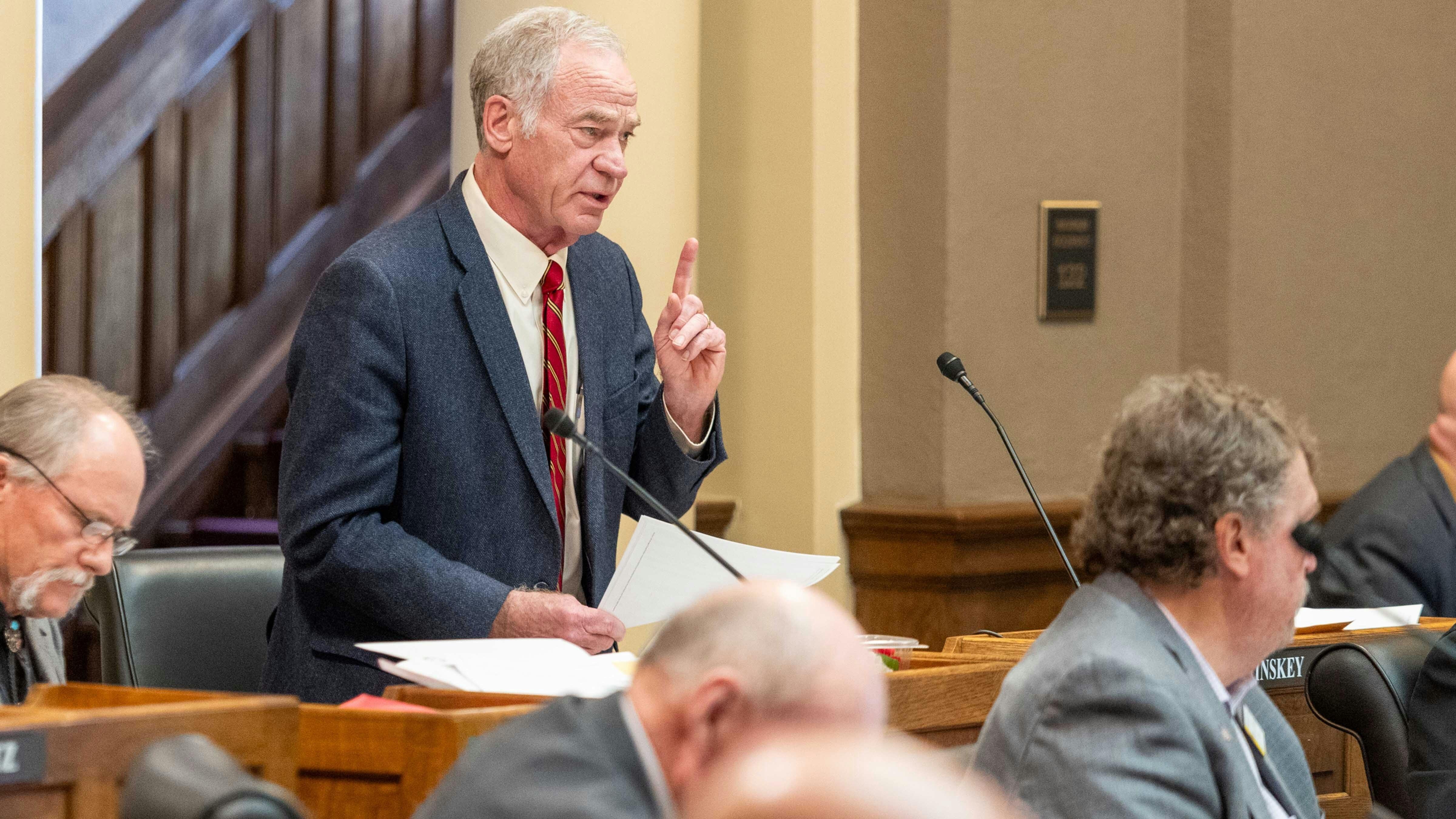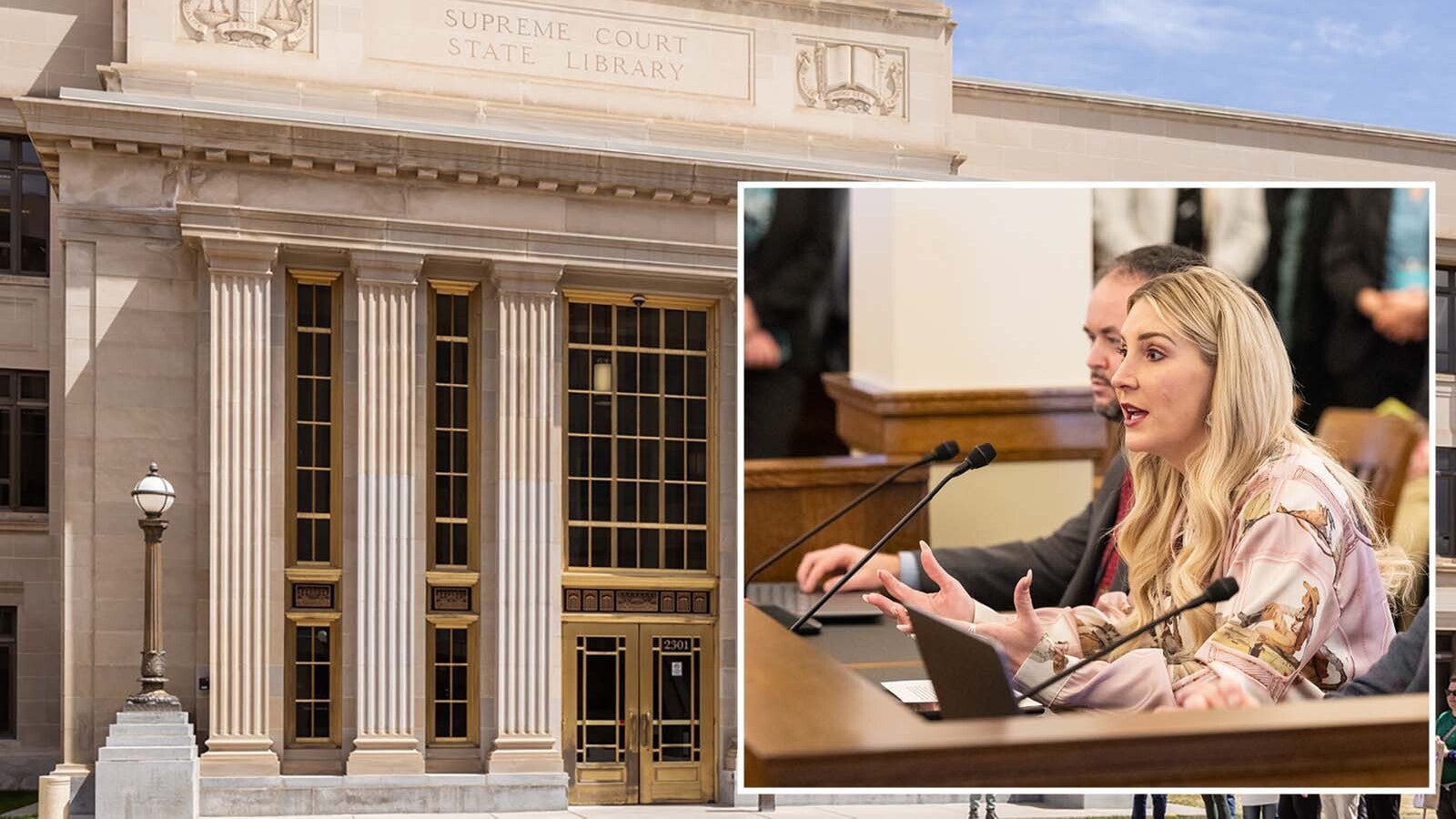The political divide between the Wyoming Senate and House of the 67th Legislature may never been as evident as showcased in the $900 million difference between the biennial budgets finalized by each chamber late Thursday night.
State Sen. Dave Kinskey, R-Sheridan, co-chair of the Joint Appropriations Committee (JAC), said the Senate came in about $750 million less than the $10.7 billion total his committee had initially arrived at entering the session. The Senate came in around $9.95 billion, according to early estimates, while the House was around $10.8 billion.
“I think it’s a good, solid conservative budget,” Kinskey said. “I think it’s a conservative budget, which the Wyoming people can be proud of.”

Senate President Ogden Driskill, R-Devils Tower, said he’s never seen a bigger difference between the two bodies on the two budgets. Last year’s supplemental budget featured a roughly $30 million difference between the two chambers.
Driskill said this is partly a result of the more conservative faction of his body gaining more power and becoming more interconnected with legislators who may be a little less conservative.
There were certain topics during the budget process where senators flipped their votes from how they voted in last year’s session.
“That’s about building coalitions in government, they’ve done it well,” Driskill said. “You’ve got to admire the process. If you go too far, either the voters or the body will repel what you’re doing. If you hit the happy medium, you get to just move the needle a little bit.”
The House completed its budget late Thursday afternoon, adding $132 million more than the JAC’s recommendation, for a roughly $10.8 billion budget proposal.
Rep. Clark Stith, R-Rock Springs, said the vast majority of the increase comes from a $69 million new facility for the state-run Veterans’ Home of Wyoming in Buffalo and other capital construction projects.
A standalone bill for the capital construction projects failed by five votes to receive the necessary two-thirds support on introduction, but an amendment to the budget only needs a simple majority. The capital construction projects in the House were approved through an amendment.
Driskill said around $200 million was cut out of capital construction on the Senate side.
The House passed its budget on a 41-21 vote while the Senate passed its version 23-8.
Most of the House amendment votes passed on extremely consistent margins.
The Wyoming Freedom Caucus said in a Thursday press release that it “offered $300 million in offsets and reductions- which were rejected by the tax-and-spend lawmakers in the House.”
Massive Cuts
The biggest difference between the two budgets isn’t that the House added a rash of new projects and spending proposals, but rather that the Senate made a significant number of cuts from the JAC’s and Gov. Mark Gordon’s budget proposals.
The Senate only approved half of Gordon’s 77-employee increase request, while the House came in lower, accepting around 50 fewer than the governor had requested.
An amendment successfully brought by Sen. Cheri Steinmetz, R-Lingle, cut $55 million in new funding from Gordon’s Large Project Energy Matching Funds program and prohibits him from using any money from this federal-matching fund for new projects moving forward.

The Senate also stripped $75 million from the University of Wyoming’s Research Matching Funds and Infrastructure matching grants programs.
In total, Driskill estimated these moves alone cut around $270 million in total spending.
In 2022, the Legislature gave money to Gordon to leverage Wyoming-based projects seeking matching funds for private or federal funding for research, demonstration, pilot projects or commercial deployment projects. Many of the projects Gordon has put this money toward has involved alternative energy approaches such as hydrogen, carbon sequestration and storage.
That approach has been a major concern for Steinmetz, who hosted a hearing on the second day of the Legislature with representatives from the CO2 Coalition, a group that denies human-caused climate change and generally opposes most forms of green energy.
The Senate also cut $111 million for major school construction funding while the House approved it.
Kelly Parcel
There were a few amendments brought in both chambers that could have significant ramifications for the controversial Kelly Parcel in Teton County. The Kelly Parcel is a pristine piece of land recommended for auction by the Office of State Land and Investments.
On Wednesday, the House passed an amendment brought by Stith stipulating to Gordon the terms of the land sale based on what plan the BLM chooses for its Resource Management Plan (RMP) for the Rock Springs area.
“I thought it was a really, really great move by Representative Stith to really tie in that language, giving authority to the governor,” House Speaker Albert Sommers, R-Pinedale said. “The Rock Springs RMP doesn’t work for southwest Wyoming and we’re not going to sell that (Kelly Parcel) unless there’s some pullback from that position. It’s just a negotiation tool.”
There were also amendments passed by Sommers and Sen. Larry Hicks, R-Baggs, that would require livestock leasing and grazing, and hunting to continue on the parcel in the future, in the event it is sold to the federal government.
An attempt made by Sen. Dan Laursen, R-Powell, to remove all stipulations, including a $100 million required asking price for the land, was defeated on an 18-13 vote Thursday afternoon.

Other Notable Amendments
An amendment brought by Rep. Cyrus Western, R-Big Horn, passed in the House ensuring $40 million for a 988 suicide hotline trust fund in the event a similarly-purposed bill doesn’t pass or passes into law with a lesser amount attached.
"To be clear, more work needs to be done," Western said in a Wednesday press release. "But we need to ensure funding for the hotline remains in place through swings in our budget to create a continuity our community can count on."
There was also an attempt made in both houses to supply the Wyoming Tourism Board with $700,000 to enter a Wyoming float in the Rose Bowl parade. This effort was defeated after significant debate in both chambers.
Joint Conference Committees
The next step in the budget process is for the differences between the two chambers’ budgets to be ironed out in joint conference committees, a process which is likely to start Monday.
Sommers and Driskill get to pick their members for this group that is designed not only to represent and lobby for their respective chamber’s budget, but also find a middle ground on disagreements for the final budget.
“The Senate came in with a much more conservative budget,” Kinskey said. “We’ll sit down together, reasonable minds. In the end I hope we come away with a conservative budget.”
Sommers said Reps. Bob Nicholas, R-Cheyenne, Tom Walters, R-Casper, Lloyd Larsen, R-Lander, will be on his committee in addition to two seats he has not yet determined. Driskill did not reveal who he will be selecting but said they will include Kinskey and other conservative-minded members.
“They made it very clear yesterday that our body is moving to the more conservative side and I’m obligated to honor that,” Driskill said.
Kinskey said he’s optimistic that these negotiations will be civil, but Sommers and Driskill are less upbeat about that.
“These are significant changes and they’ll be hotly divided between the House and Senate,” Driskill said.





